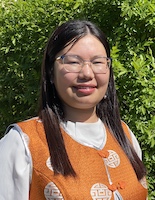The dialogism of ritual poetry and its expression and function in the Tuvan yoreels and algyshes
DOI:
https://doi.org/10.25178/nit.2022.1.5Keywords:
rite; Tuvan ritual poetry; Shamanism in Tuva; yoreel; algysh; dialogism; dialogisation; Tuvan language; TuvansAbstract
The article examines the linguistic means of actuializing dialogism in the texts of Tuvan ritual poetry, with a special focus on good wishes (yoreel) and Shamanic cult incantations (algysh). Both genres come as a verbal component of a cultural or healing ritual and are performed monologically. However, they also preserve dialogical features, with dialogism appearing as interaction between their speaker and addressee.
Subjects of these dialogical relationship have been described in the article, as well as the ways they can be made explicit in the text. It was discovered that dialogism is activated by different means, such as direct appeals, different forms of the imperative mood with the semantics of inducement to perform an action, the question-answer combination, question sentences of different functional and stylistic types, the "we"-forms, bringing together both subjects of the dialogue and calling on them for a joint action. The details of using the imperative, depending on the speaker and the verb semantics, have also been studied.
The article also examines a variety of functions the dialogism performs, such as the pragmatic, appellative, and phatic, as well as the function to describe the relations between the subjects in a dialogue. All in all, the linguistic means of implementing these functions are also identified, and the performative verbs which act as a specific means of explication.
References
Bakhtin, M. M. (1986) Estetika slovesnogo tvorchestva [Aesthetics of verbal art]. Moscow, Iskusstvo. 424 p. (In Russ.).
Bredis, M. A., Dimoglo, M. S. and Lomakina, O. V. (2020) Paremii v sovremennoi lingvistike: podkhody k izucheniiu, tekstoobrazuiushchii i lingvokul'turologicheskii potentsial [Paremies in contemporary linguistics: Approaches to studying, text-forming and linguocultural capabilities]. RUDN Journal of Language Studies, Semiotics and Semantics, vol. 11, no. 2, pp. 265–284. (In Russ.) DOI: https://www.doi.org/10.22363/2313-2299-2020-11-2-265-284
Bredis, M. A., Lomakina, O. V. and Mokienko, V. M. (2019) Poslovitsa v sovremennoi lingvistike: opredelenie, status, funktsionirovanie [The proverb in contemporary linguistics: definition, status, and functioning]. Vestnik Moskovskogo universiteta, issue 19: Lingvistika i mezhkul'turnaia kommunikatsiia, no. 3, pp. 34–43. (In Russ.).
Bredis, M. A., Ivanov, E. E., Lomakina, O. V., Neliubova, N. Yu. and Kuzhuget, Sh. Yu. (2021) Leksikograficheskoe opisanie tuvinskikh poslovits: printsipy, struktura, etnolingvokul’turologicheskii kommentarii (na evropeiskom paremiologicheskom fone) [A lexicographical description of Tuvan proverbs: Principles, structure and an ethnolinguoculturological commentary as compared to European paremies]. New Research of Tuva, no. 4, pp. 143-160. (In Russ.). DOI: https://www.doi.org/10.25178/nit.2021.4.11
Weinstein, S. I. (1964) Tuvinskoe shamanstvo [Tuvan shamanism]. Moscow, Nauka. 12 p. (In Russ.).
Dongak, U. A. (2006) Tuvinskoe stikhoslozhenie [Tuvan versification]. Kyzyl, Tuvan Book Publishing House. 149 p. (In Russ.).
Duskaeva, L. R. (2004) Dialogicheskaia priroda gazetnykh tekstov 1980–1990 gg. [Dialogical nature of newspaper texts, 1980–1990]. Perm', Izd-vo Permskogo un-ta. 276 p. (In Russ.).
Ivanov, E. E. (2009) Kriterii sistematizatsii aforisticheskogo materiala kak ob"ekta leksikograficheskogo opisaniia [Criteria for systematizing of aphoristic material as an object of lexicographic description]. Journal of Historical, Philological and Cultural Studies, no. 2 (24), pp. 88–91. (In Russ.).
Ivanov, E. E. (2019a) Aspekty empiricheskogo ponimaniia aforizma [Aspects of empirical understanding of aphorisms]. RUDN Journal of Language Studies, Semiotics and Semantics, vol. 10, no. 2, pp. 381–401. (In Russ.). DOI: https://www.doi.org/10.22363/2313-2299-2019-10-2-381-401
Ivanov, E. E. (2019b) O rekurrentnosti aforisticheskikh edinits v sovremennom russkom iazyke [Aphoristic units and their recurrence in modern Russian language]. Russian Language Studies, vol. 17, no. 2, pp. 157–170. (In Russ.). DOI: https://doi.org/10.22363/2618-8163-2019-17-2-157-170
Ivanov, E. E. (2020) Aforizm kak ob"ekt lingvistiki: osnovnye priznaki [The aphorism as an object of linguistics: main properties]. RUDN Journal of Language Studies, Semiotics and Semantics, vol. 11, no. 4, pp. 659–706. (In Russ.). DOI: https://www.doi.org/10.22363/2313-2299-2020-11-4-659-706
Ivanov, E. E., Lomakina, O. V. and Neliubova, N. Yu. (2021) Semanticheskii analiz tuvinskikh poslovits: modeli, obrazy, poniatiia (na evropeiskom paremiologicheskom fone) [Semantic analysis of Tuvan proverbs: models, imagery, concepts (against the European paremiological background)]. New Research of Tuva, no. 3, pp. 232–248. (In Russ.). DOI: https://www.doi.org/10.25178/nit.2021.3.17
Kenin-Lopsan, M. B. (1987) Obriadovaia praktika i fol'klor tuvinskogo shamanstva. Konets XIX — nachalo XX v. [Ritual practice and folklore of Tuvinian shamanism. Late XIX — early XX century]. Novosibirsk, Nauka. 165 p. (In Russ.).
Kenin-Lopsan, M. B. (1995) Tyva khamnarnyn algyshtary [Algyshs of Tuvan shamans]. Kyzyl, Novosti Tuvy. 530 p. (In Tuv.).
Kenin-Lopsan, M. B. (2009) Tuvinskie shamany [Tuvan shamans]. Moscow, Maska. 325 p. (In Russ.).
Kenin-Lopsan, M. B. (2017) Algyshi tuvinskikh shamanov [Algyshs of Tuvan shamans]: trans. by author. Yakutsk, Bichik. 206 p. (In Russ.).
Komleva, E. V. (2008) Apelliativnost' v iazyke i rechi (na materiale sovremennogo nemetskogo iazyka) [Appeal in language and speech (based on the material of the modern German language)]. Vestnik Leningradskogo gosudarstvennogo universiteta im. A. S. Pushkina, no. 5 (19), pp. 152–164. (In Russ.).
Kuzhuget, Sh. Yu., Suvandii, N. D., Lamazhaa, Ch. K. (2021) Problema perevoda kontseptov kul'tury na drugoi iazyk: na primere tuvinskikh kontseptov kul'tury [The Problems Of Translating Cultural Concepts into Another Language: On The Example Of Tuvan Cultural Concepts]. Polylinguality and Transcultural Practices, vol. 18, no. 4, pp. 405–420. (In Russ.). DOI: https://doi.org/10.22363/2618-897X-2021-18-4-405-420
Kurbatskii, G. N. (2001) Tuvintsy v svoem fol'klore (istoriko-etnograficheskie aspekty tuvinskogo fol'klora) [Tuvans in their folklore: Historical and ethnographic aspects of Tuvan folklore)]. Kyzyl, Tuva book publishing house. 464 p. (In Russ.).
Kyrgys, Z. K. (2015) Tuvinskie narodnye pesni i obryadovaya poeziya [Tuvan folk songs and ritual poetry]. Novosibirsk, Sibirskaya gornica Publ. 432 p. (In Russ.).
Lamazhaa, Ch. K. (2018) Natsional'nyi kharakter tuvintsev [National character of Tuvans]. Moscow, St. Petersburg, Nestor-Istoriia. 240 p. (In Russ.)
Maslov, Yu. M. (1998) Vvedenie v iazykoznanie [Introduction to Linguistics]. Moscow, Vysshaia shkola. 272 p. (In Russ.)
Novik, E. S. (2004) Obriad i fol'klor v sibirskom shamanizme. Opyt sopostavleniia struktur [Ritual and folklore in Siberian shamanis: an attempt at structural comparison]. 2nd ed. Moscow, Vostochnaia literatura. 304 p. (In Russ.)
Oorzhak, B. Ch. (2017) Imperativ v obriadovoi poezii tuvintsev [Imperative in the ritual poetry of Tuvans]. Filologiia i kul'tura, no. 4(50), pp. 51–57. (In Russ.)
Paremiologiia bez granits [Paremiology without borders] (2020) / ed. by M. A. Bredis and O. V. Lomakina. Moscow, RUDN Publ. 244 p. (In Russ.).
Paremiologiia v diskurse [Paremiology in Discourse] (2015) / ed. by O. V. Lomakina. Moscow, URSS; Lenand. 294 p. (In Russ.).
Prokhvatilova, O. A. (1999) Pravoslavnaia propoved' i molitva kak fenomen zvuchashchei rechi [Orthodox sermon and prayer as a phenomenon of speech]. Volgograd, Izd-vo VolGU. 362 p. (In Russ.)
Samdan, Z. B. (1986) Khudozhestvennoe osmyslenie vzaimootnoshenii cheloveka i prirody v tuvinskom fol'klore [Artistic understanding of the relationship between man and nature in Tuvan folklore]. In: Issledovaniya po tuvinskoj filologii [Studies in Tuvan philology] / ed. by D. A. Mongush. Kyzyl, TNIIYALI. 156 p. Pp. 118–128. (In Russ.)
Samdan, Z. B. (2019) Modifikatsiia arkhetipicheskogo obraza tuvinskogo shamana v tvorchestve M. B. Kenin-Lopsana [Modifications of the archetypal image of the Tuvan shaman in the works of M. B. Kenin-Lopsan]. New Research of Tuva, no. 3, pp. 158–171. (In Russ.) DOI: https://doi.org/10.25178/nit.2019.3.13
Seliverstova, E. I. (2009) Opyt vyiavleniia poslovichnogo binoma i problema variantnosti [Identifying the proverbial binomial and the problem of variation]. Russkii iazyk v nauchnom osveshchenii, no. 1(17), pp. 182–200. (In Russ.)
Seliverstova, E. I. (2020) Iavlenie deformatsii poslovits skvoz' prizmu zakonov paremiologicheskogo prostranstva [The phenomenon of deformation of proverbs through the prism of the paremiological space and its laws]. Vestnik of Saint Petersburg University. Language and Literature, no. 17 (3), pp. 457–473. (In Russ.) DOI: https://doi.org/10.21638/spbu09.2020.307
Semenenko, N. N. (2020) Aksiologiia paremii v fokuse problemy kognitivno-diskursivnogo modelirovaniia semantiki russkikh poslovits [Axiology of proverbs in the focus of the problem of cognitive-discursive modeling of semantics of Russian proverbs]. RUDN Journal of Language Studies, Semiotics and Semantics, vol. 11, no. 2, pp. 213–232. (In Russ.) DOI: https://doi.org/10.22363/2313-2299-2020-11-2-213-232
Tuvinsko-russkii slovar' [A Tuvan-Russian Dictionary] (1968): c. 22000 words / ed. by E. R. Tenishev. Moscow, Sovetskaia entsiklopediia. 465 p. (In Russ. and Tuv.).
Yakobson, R. (1987) Raboty po poetike [Works on poetics]. Moscow, Progress. 462 p. (In Russ.)
Yakubinskii, L. P. (1986) O dialogicheskoi rechi [About dialogical speech]. In: Iazyk i ego funktsionirovanie [Language and its functioning: Selected works] / ed. by A. A. Leont'ev. Moscow, Nauka. 205 p. Pp. 17–58. (In Russ.)
Korolkova, A. V. (2020) Language as a Concept of Russian Aphoristics. RUDN Journal of Language Studies, Semiotics and Semantics, vol. 11, no. 3, pp. 434–447. DOI: https://doi.org/10.22363/2313-2299-2020-11-3-434-447
Published
How to Cite
For citation:
Prosyannikova O. I., Skorik K. V. and Kuzhuget Sh. Yu. Dialogichnost' obriadovoi poezii: sredstva realizatsii i funktsionirovanie v tuvinskikh blagopozhelaniiakh i algyshakh [The dialogism of ritual poetry and its expression and function in the Tuvan yoreels and algyshes]. New Research of Tuva, 2022, no. 1, pp. 69-89. (In Russ.). DOI: https://www.doi.org/10.25178/nit.2022.1.5
Issue
Section
Copyright (c) 2022 Журнал "Новые исследования Тувы" (составление)

This work is licensed under a Creative Commons Attribution-NonCommercial 4.0 International License.

Author(s) license holder(s) grant rights for their work to the journal (grantee of a license) under the simple non-exclusive open license in accordance with Art. 1286.1 «Open license for a research work, work of literature or fine arts», Civil Code of the Russian Federation.
New Research of Tuva publishes articles under the Creative Commons Attribution-NonCommercial license (CC BY-NC).
Since it is an open license, author(s) reserve the right to upload the article to their institutional repository, submit it to another journal (if it allows republications), or republish it on their own website (in full, or in part).
However, several conditions apply here:
a) The republished version must always contain the name(s) and affiliation(s) of the author(s), the original title and the hyperlink to the original version on the New Research of Tuva website;
b) It must be in open access, free of charge, and no category of readers must be in any way whatsoever advantaged over general readership.
c) should the contribution be submitted elsewhere by its author(s) without substantial modification (30% or more of original text unchanged), the body of the article should contain a disclaimer that the original version was published in New Research of Tuva (with a link to the respective page)
The CC-BY-NC is a non-revocable license which applies worldwide and lasts for the duration of the work’s copyright.











